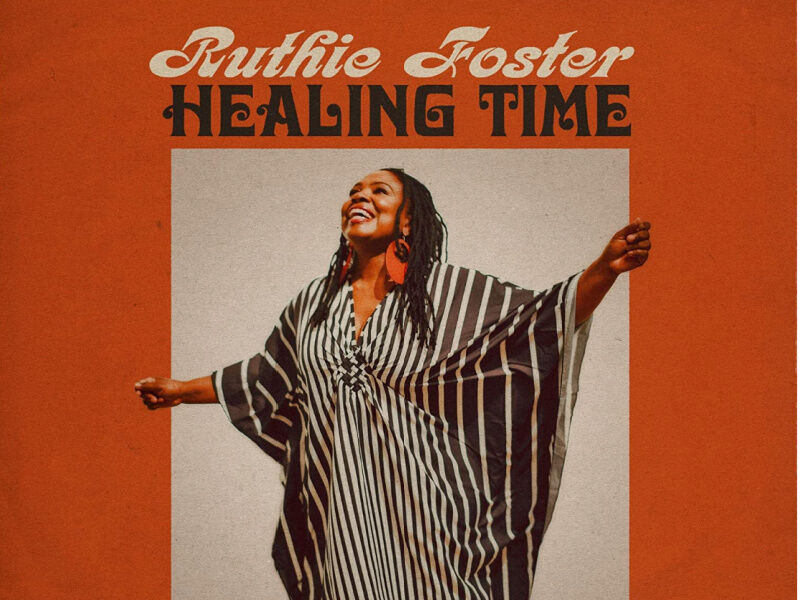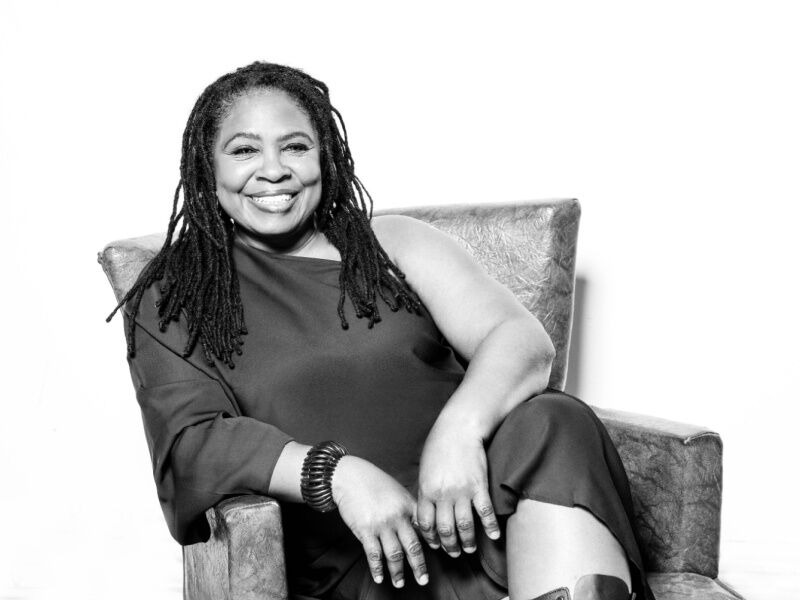By P.A. Geddie
The joyful energy coming off any stage lucky enough to hold Ruthie Foster wraps around audience members like a warm quilt on a cold and rainy day. Her passionate Texas blues and Americana vibe brings a sense of peace to listeners that makes them feel everything’s going to be okay.
Born in Mineola, Texas, on February 10, 1964, she was surrounded by musical talent from the beginning. Her family was the church choir — singers, musicians, gospel storytellers.
She moved with her mother to Gause, Texas, in Milam County near College Station before she started elementary school and spent much of her childhood in East Texas with her dad and extended family too. From an early age she was comfortable on the church stage with her relatives and learned to play piano, backing up the singers.
“I didn’t want to be the person up front,” Foster remembers. “But it’s a right of passage when you get a chance to solo and sing. Everybody else sang.”
Still she held back, preferring to accompany others on piano, then guitar. Her piano teacher’s husband played guitar, so she started taking lessons from him too and her joy in playing guitar led to her finding her voice.
“When my mother heard me playing guitar she said, ‘Now you just need to open your mouth and sing.’”
So she did. She was singing solo by the age of 14 and knew music was her calling. After high school she moved to Waco for community college, concentrating in music and audio engineering. She began fronting a blues band and playing on Texas stages.
Foster joined the Navy to see the world and during her tour she was the front singer and played the keyboard with naval bands. She did big band music, pop, funk, and jazz hits across the country.
“Wherever the admiral went, we went,” she recalls. “We traveled to a lot of high schools, getting kids excited to sign up for the Navy. If we weren’t traveling, we were rehearsing. That experience set me up for what I’m doing today.”
After her tour of duty, she headed to New York City where she was a regular performer at folk venues. At least one record company approached her to “make her a pop star” but she wasn’t interested. Her commitment to Americana roots music kept her independent.
In 1993, Foster’s mother became ill and she came back to Texas to be with her. She worked as a camera operator and production assistant at a television station in College Station while caring for her mother until her death in 1996.
“I quit playing music full time. I moved home and I became my mother’s daughter again. I wanted her to be proud of me. I joined her church. I took her to spend time with her mother. I wanted to take care of what she needed.”
Foster lived in an apartment close to her mother. She performed at coffee shops, nursing homes, and churches while her mother cheered her on.
“My mother was a huge part of my shows,” Foster says. “She was a beautician and I let her do my makeup and hair. She couldn’t see very well and I’d come out with 60s puffed up style. I think she thought ‘the higher the hair, the closer to God.’ I’d calm it all down when I got to the venue.”
This precious time with her mother changed her life, Foster says.
“I got to know my mother, woman to woman. We got to kid around. I heard her love stories with my dad and about when they were courting. She would light up. It filled me with a peace I didn’t know I was missing.”
After her mother’s death, Foster walked through her grief with the warm memories she and her mother made together. She felt more like a whole person, she says, and ready to move on with her music and performing lifestyle.
“I bought a used truck, loaded it with equipment, and started touring.”
Her shows were different now. She felt her mother with her and she began to not only sing, but to find her speaking voice and relate stories of her family to the audience.
“My shows weren’t shows any more — they were an experience. It was a chance to speak for my mother, and for my grandmother Big Mama — strong, intelligent women who had your back. I was relaying their stories and their lives. My shows became real.”
She added more gospel and spoke more about women’s issues and her extended family as she continued providing authentic experiences for her audiences.
“I’m giving you a part of my family, a piece of East Texas and next to the Brazos River. There’s Big Mama, PawPaw, Aunt Sugarlump, and my mother they called Puddin’. My heritage. I bring everybody with me. I’m a better songwriter, better overall performer, and better person because they are with me on stage.”
Foster began releasing albums in 1997 and continued to make records every few years to the delight of her growing fan base. Awards include four Grammy nominations and numerous wins from a wide variety of music award competitions.
Her most recent record is Healing Time, her ninth studio album. It is a collection of 12 powerful songs that provide a guide for how to move through the world with compassion and resolve. She contributed more to the writing process than she did on any of her previous albums, refining her own song craft in the process.
Work began on the album during COVID lockdown. She enlisted previous collaborators Gary Nicholson and Grace Pettis to pitch in during the writing process as well as every member of her band.
“This album is about what we all went through during and coming out of the lockdown. It’s about flying with my fellas. It’s about sitting in a room together and spending healing time — coming to a place where it’s time to be who you need to be for yourself and your family. It’s about soul searching and trying to bring the world together and figuring out how to get along.”
Healing Time is a work that explores what being human often brings to the surface, reminding listeners that even when they feel like they’re at the top, they’re ultimately still finding their way, and that’s okay.
Foster is touring the country with the album and has several shows in the Upper East Side of Texas before jetting off to Athens, Greece, this summer. She’s at The Palace Theatre in Corsicana on March 30, Memorial City Hall Performance Center in Marshall on April 1, and returns to Liberty Hall in Tyler for an April 22 show.
“I’m proud of my ties to East Texas,” Foster says. “It’s been really interesting learning more about my family the older I get. Learning about more of them that were singers and traveling gospel musicians. I’m quite proud of that.”
Foster performed in February for a Black History Month program in Mineola. As much love as she holds in her heart for her roots there, America’s racial divide is part of her story.
Her father talks about many good aspects of growing up in Mineola, she says, and sometimes quietly speaks about the indignities of the past as well.
The esteemed Beckham Hotel in downtown Mineola served the railroad industry and other travelers beginning in the 1920s for several decades. Those of African descent were not allowed in the building, except perhaps as servants. After two devastating fires, the Beckham closed and the building remained empty for many years.
In 1989, music teacher John DeFoore purchased the building. For almost 20 years he taught guitar and songwriting in studios on the ground floor and held concerts on the second floor.
During those years, one well attended concert featured the talented Ruthie Foster. In the hours before her show, she visited with her dad and he went with her to the Beckham for a sound check.
“Walking up the stairs, my dad’s walking behind me, and he stops halfway up,” Foster says, asking him what’s wrong.
“He said, ‘I need a minute. As a Black man, I was never allowed to go up these stairs.’”
This struck a chord with her as the reality of racial divide so close washed over her.
“That was the first time hearing my dad talk about it,” she says. “Here’s my dad telling me about the real history from his eyes of this particular building.”
The music that DeFoore filled that building with all those years gave it a bit of much needed “healing time” and in recent years it’s been restored as an elegant hotel and ballroom welcoming people from all walks of life.
Perhaps that is true also of Liberty Hall in Tyler where Foster’s father tells her of other injustices he experienced years ago. He worked there running the film projector but wasn’t allowed to sit in the theater seats. Now, with his daughter on center stage, he gets the best seat in the house.
Remembering one of her last gigs at Liberty Hall, Foster said she always makes sure having a number of seats for her family is part of her agreement with the venue. This time, someone sold her extra seats in error.
“I’m not playing until my dad has a seat,” she firmly told them.
Thankfully, some generous fans gave up their balcony seats for her dad and her “beautiful-like-my-mom” stepmother.
“I called his name and he waved like he was King of the Universe.”
To purchase Healing Time and learn more about Foster, visit www.ruthiefoster.com.



